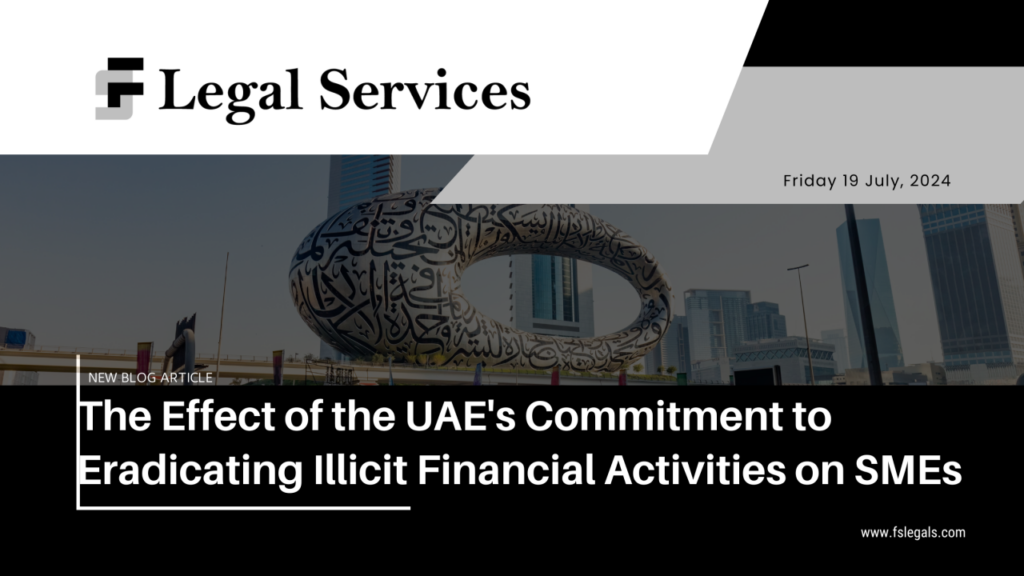
The UAE government has demonstrated a strong commitment to enhancing its Anti-Money Laundering (AML) and Counter-Terrorist Financing (CTF) measures, taking significant strides to combat corruption and illicit financing. This article explores the impact of these measures on Small and Medium Enterprises (SMEs) in the UAE.
Key Measures Taken by the UAE Government
Establishment of the UAE Accountability Authority (UAEAA)
The UAEAA plays a crucial role in preventing and combating corruption within the UAE. It oversees and enforces accountability and transparency in governmental entities.
Executive Office Establishment
The UAE has set up the Executive Office to Combat Money Laundering and Terrorist Financing, tasked with enhancing AML/CTF legislation and the regulatory framework.
Anti-Money Laundering Legislation
The UAE has enacted comprehensive AML legislation, including the Federal Law 20 of 2018 on Anti-Money Laundering and Combating the Financing of Terrorism and Illegal Organizations. This law sets out obligations for businesses to implement AML controls.
Enhanced Supervision and Enforcement
Regulatory bodies like the Central Bank of the UAE and the UAE Securities and Commodities Authority (SCA) have been strengthened to enhance supervision and enforcement of AML regulations. They conduct regular audits and inspections to ensure compliance.
Collaboration with International Partners
The UAE actively collaborates with international partners to combat corruption and money laundering. They are signatories to international agreements and protocols aimed at exchanging information and cooperation in investigating and prosecuting corrupt practices.
goAML Reporting Platform
The UAE introduced the “goAML,” a reporting system developed by the United Nations Office on Drugs and Crime (UNODC) to combat money laundering and the financing of terrorism. Financial institutions and designated non-financial businesses and professions are required to report suspicious transactions if they suspect criminal fund involvement.
Compliance Requirements for SMEs
Implement Internal Controls
SMEs should establish robust internal control systems to mitigate risks associated with corruption and money laundering. This includes implementing policies and procedures for identifying and assessing risks, monitoring transactions, and reporting suspicious activities.
Conduct Risk Assessment
SMEs must assess the risks they face regarding corruption and money laundering. This involves identifying potential vulnerabilities and developing strategies to mitigate those risks effectively.
Train Employees
Regular training programs should be conducted to educate employees about anti-corruption and AML measures. Awareness programs should cover topics like ethical behavior, whistleblowing mechanisms, and reporting suspicious transactions.
Adhere to Regulations
SMEs must comply with all applicable regulations and requirements related to anti-corruption and AML. This includes conducting due diligence on clients, maintaining records, and filing necessary reports.
Challenges Faced by SMEs
Limited Resources
Many SMEs operate with limited resources, including financial constraints, which can make it challenging to allocate sufficient funds for implementing and maintaining effective anti-corruption and AML controls.
Lack of Expertise
SMEs may struggle to hire or retain qualified staff who possess the necessary expertise in anti-corruption and AML compliance. This lack of specialized knowledge can hinder their ability to understand and properly implement the required measures.
Complex Regulations
AML regulations can be complex and constantly evolving, requiring SMEs to stay updated with changes and adapt their processes accordingly. Non-compliance can result in severe penalties and damage to reputation.
Risk Management
Identifying and managing the risks associated with corruption and money laundering can be challenging for SMEs, especially if they operate in high-risk sectors or deal with international counterparts.
Overcoming Compliance Challenges
Allocate Adequate Resources
SMEs should prioritize allocating adequate resources, including time and budget, towards establishing robust internal control systems and risk management frameworks. By investing in these areas, SMEs can lay a solid foundation for compliance and reduce vulnerability to corruption and money laundering.
Seek Guidance and Consultation
Seeking guidance and consultation from experts and industry professionals is highly recommended. Engaging with professionals and lawyers specializing in anti-corruption and AML ensures that SMEs receive accurate and tailored advice, enabling them to navigate complex regulations effectively.
Leverage Resources Provided by Governing Bodies
Leveraging resources provided by governing bodies, industry associations, and organizations focused on supporting SMEs can greatly aid in obtaining valuable insights, tools, and guidance for compliance efforts.
Foster a Culture of Ethics and Integrity
Fostering a culture of ethics and integrity within the organization is paramount. Encouraging open communication, promoting ethical behavior, and instilling a zero-tolerance approach towards corruption will empower SMEs to create an environment where compliance becomes ingrained in their organizational DNA.
Stay Updated on Latest Developments
SMEs must stay updated on the latest developments in anti-corruption and AML laws to ensure compliance and mitigate risks effectively. This involves regularly reviewing legal updates, subscribing to industry newsletters, and participating in relevant seminars and workshops. Engaging with legal and compliance experts to gain insights into new regulations and best practices is also crucial. Leveraging technology, such as compliance software and online platforms, can help monitor changes and implement necessary adjustments swiftly.
Conclusion
By adopting these measures and seeking appropriate assistance and advice, SMEs can successfully navigate the complex regulatory landscape, overcome challenges, and remain compliant with anti-corruption and AML regulations. This will safeguard them from legal, reputational, and operational risks, ensuring sustainable growth and fostering a clean and transparent business environment in the UAE.